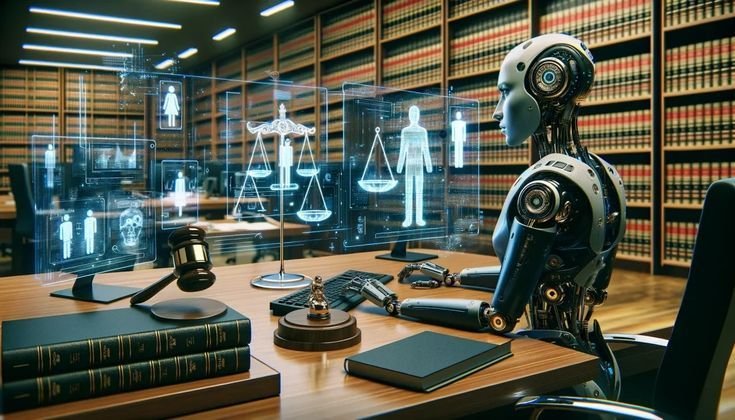I remember the first time I walked into a lawyer’s office. The shelves were stacked with gigantic books that looked like they could double as dumbbells. The lawyer himself flipped through pages with a kind of wizardly speed, muttering Latin phrases I didn’t understand. Honestly, LegalTech I thought: this is why legal stuff is scary.
Fast forward a few years, and guess what? Many of those massive books are now apps. Those muttered Latin phrases? Searchable in seconds. Even contract reviews that once took nights of coffee and highlighters are now handled by AI tools that don’t yawn.
Welcome to LegalTech — the merger of law and technology. Basically, it’s about using software, AI, and digital platforms to make the legal world less intimidating, more efficient, and (hopefully) a little less expensive.
What Exactly Are LegalTech Tools?
In plain talk: these are apps and platforms designed to help with legal work. Think of them as the “tech interns” who never get tired.
Some are for lawyers — document management, case tracking, contract analysis.
Some are for regular people — apps that draft simple agreements, or help you fight parking tickets.
And some are for big organizations — compliance systems, e-discovery platforms, risk management dashboards.
Basically, anything in law that involves paper, people, or procedure… LegalTech tries to digitize it.
Everyday Examples
You’ve probably bumped into LegalTech without realizing it:
DocuSign – Ever signed a contract online? That’s LegalTech.
Clio – Lawyers use it to manage clients and cases.
LegalZoom – Helps normal folks create wills, LLCs, or trademarks without hiring a lawyer.
Ross Intelligence (RIP, but legendary) – AI that once helped search case law faster than humans.
DoNotPay – The cheeky app that calls itself “the world’s first robot lawyer,” helping people appeal fines or cancel subscriptions.
See? LegalTech isn’t some far-off concept. It’s already hiding in your inbox.

Why It’s Catching On
Let’s be honest: legal stuff has a bad rep. People imagine long waits, massive fees, and confusing language. LegalTech is like the cool younger cousin that says, “Relax, we’ve got apps for that.”
Speed – A contract review that used to take days? Now minutes.
Cost – Automated tools slash billable hours.
Access – People who couldn’t afford lawyers can now get basic help online.
Transparency – Digital case tracking makes it easier to see what’s happening.
I once helped a friend generate a lease agreement online. He expected to spend thousands. Instead, it took 20 minutes and a small fee. His jaw dropped.
The Fun Side (Yes, Law Can Be Fun)
Believe it or not, LegalTech has quirks that make you laugh:
Chatbots for Divorce – Some tools help couples draft divorce papers without ever speaking to each other (probably for the best).
AI Judges? – In some places, algorithms help suggest bail or sentencing guidelines. Scary but fascinating.
Subscription Cancelers – Apps that sue companies when they make it too hard to unsubscribe.
Robo-paralegals – Software that finds tiny mistakes in contracts faster than the sharpest human.
One friend joked that if LegalTech keeps evolving, lawyers will start billing apps for stealing their jobs.
The Not-So-Fun Side
Of course, it’s not all smooth sailing:
Accuracy Issues – AI makes mistakes, and in law, mistakes are expensive.
Privacy Concerns – Sensitive case files stored on the cloud? Hackers would love that.
Job Fears – Paralegals and junior lawyers worry about being replaced.
Bias in Algorithms – If data is biased, AI decisions could also be unfair.
Trust Factor – Many people still prefer a human lawyer’s advice, even if tech is faster.
I once saw an AI tool suggest the wrong clause in a rental contract. Imagine if someone signed that blindly — disaster.
LegalTech Around the World
The US, startups dominate — from contract automation to e-discovery.
In Europe, privacy tools are hot, especially with GDPR rules.
In Asia, LegalTech often focuses on simplifying small business compliance.
The Pakistan and India, legal help apps are popping up, connecting people to affordable lawyers by phone or chat.
Different countries, different rules — but the hunger for simpler legal help is universal.

The Future (Half Sci-Fi, Half Real)
Here’s what might be coming:
AI Contract Negotiators – Bots that argue with each other to finalize deals.
Blockchain Courts – Disputes resolved by code, not humans.
Virtual Law Firms – Entire firms existing only online, with no physical offices.
Voice-Activated Law – “Alexa, draft me a rental agreement.”
Predictive Justice – AI forecasting trial outcomes with scary accuracy.
Part of me is excited. Part of me is terrified. Imagine losing a case because a robot judge “didn’t like your data.”
The Ethical Questions
With law, ethics matter a lot. Some big ones:
Who is responsible when AI messes up? The coder? The lawyer? The client?
Does tech make justice more accessible — or just more confusing?
Will rich firms get better LegalTech, widening the justice gap?
Can empathy be coded? Law isn’t just rules; sometimes it’s compassion.
Law has always been about fairness. If we outsource too much to machines, we risk losing the “human touch” in justice.
My Two Cents
I like LegalTech. It makes boring paperwork less painful and helps regular people avoid getting ripped off. But I’m also wary. Law isn’t only about speed or efficiency — it’s about people, fairness, and stories. A lawyer listening to your worries over tea can’t be replaced by an app.
That said, I’d happily let AI draft my contracts (less typos, less stress). But if I were fighting a serious case in court? Yeah, I’d still want a real lawyer standing by my side. Preferably one who knows more Latin than me.
Quick Q&A
Are LegalTech tools replacing lawyers?
Not really. They’re replacing routine tasks, not courtroom advocacy.
Can I write my will online?
Yes, many platforms help with simple wills. But for complex estates, a lawyer is still best.
Are these tools safe?
Mostly yes, but always check security policies — legal data is sensitive.
Do lawyers like LegalTech?
Some love it (less grunt work), some hate it (fewer billable hours).
Is it only for big law firms?
Nope. Solo lawyers and even regular people can use many tools.

